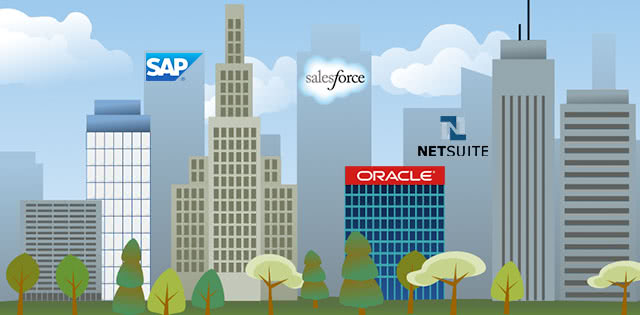ERP
ERP in the Cloud: If You Build It, Will they Come?

After investing for years in enterprise resource planning (ERP) systems, is it finally time to abandon the on-premise strategy and migrate to cloud computing? While the big ERP vendors like IBM, SAP, Salesforce, Oracle and Microsoft say the move to the cloud is inevitable, it is hard to believe that customers will surrender the ERP platforms they’ve tended for years.
Moving to Cloud ERP: An Inevitable Shift
According to Gartner, on-premise ERP systems will be part of “legacy software” by 2016. In a new report issued in January, Gartner predicts that 30 percent of organizations will move most of their ERP applications to the cloud by 2016, and 70 percent will be using hybrid ERP systems by 2017.
Those most affected by the migration to the cloud will be enterprise systems in energy, manufacturing, logistics and other verticals that were early believers in ERP. These early ERP adopters will migrate to what Gartner calls “postmodern ERP,” a blending of both old on-premise solutions and new cloud applications that extend existing legacy systems. These companies will be motivated to move by two factors:
- The desire to access cool, innovative ERP solutions that are only developed in the cloud
- The high cost of keeping their aging ERP systems on life support
What Companies Save with ERP in the Cloud
So how will companies save in the new era of postmodern ERP? Ray Wang, an analyst for Forrester Research, explains:
“For companies with 100 users, they definitely see a savings in two areas: total cost of ownership and the total economic impact on return on investment are higher for SaaS.”
Sheryl Kingstone of The Yankee Group did an analysis of hosted versus non-hosted ERP services over a five-year period. She determined that the SaaS total cost of ownership for her use case was $723,000 versus $1,160,000 TCO for on-premise ERP.
Migrating to a SaaS ERP strategy offers faster time to value, largely because of the lack of hands-on management. With cloud ERP deployments, the SaaS provider handles all of the headaches and updates, so that IT staff are free to deal with other issues. And ERP users save on the cost of hardware, customization, training and maintenance—all things that on-premise ERP demands.
Making the Switch: It’s Not Just About Money
The big vendors who sell ERP have also seen the writing in the sky and are now embracing the cloud as an extension of or replacement for on-premise ERP. Oracle recently introduced the Oracle Customer 2 Cloud program, which addresses both financial and technical challenges to ease migration to cloud applications. This decision came about because a reported 29 million users have already embraced Oracle Cloud, and others are likely to follow.
SAP, the market leader in ERP with $6.1 billion in software sales last year, claims to have 35 million business users utilizing its cloud computing platform. SAP is promoting what they call SAP Business One Cloud, with an eye toward bringing in small business customers with cloud savings. The old ERP guard recognizes that there’s money in the cloud. They are looking to both wean legacy customers from on-premise ERP and attract new customers.
And then there are the upstarts like NetSuite. At SuiteWorld 2014, NetSuite announced a number of strategic partnerships intended to strengthen its position in the midmarket for ERP in the cloud. As Andrew Dailey of MGI Research noted in Forbes:
”Companies today are increasingly looking to migrate away from on-premise solutions, and NetSuite is positioning itself as the provider of choice for midmarket ERP solutions, much as SAP offered a single integrated solution for on-premise applications in the 1990s.”
Strategic partnerships are increasingly important in an arena where no single vendor offers end-to-end ERP. Salesforce.com, for example, is becoming a force to be reckoned with in cloud ERP, having added a number of ERP cloud providers to its AppExchange, notably Kenandy and FinancialForce. As with NetSuite, Salesforce is relying on third parties to round out its ERP offering to provide one-stop shopping for business customers of all sizes. In fact, Salesforce is proving such a cloud ERP powerhouse that Microsoft recently inked a “coopetition” deal with Salesforce.
The Tenacity of On-Premise ERP
What all these cloud ERP vendors offer is added capabilities with minimal investment. Cloud computing has reached a level of maturity; it can scale to handle large numbers of transactions, and worries about security and enterprise integration have been handled. ERP customers have everything to gain and nothing to lose from cloud-based ERP, aside from their legacy ERP systems.
This brings us back to postmodern ERP. The larger customers in energy, manufacturing and related industries will take longer to unburden themselves of legacy on-premise ERP—they would rather fight for their legacy ERP than switch to the cloud. Midsize companies, on the other hand, have less invested and more to gain from hosted ERP. These companies are hungry for new ERP capabilities to help them compete, and they have no trouble embracing new cloud solutions. Bringing together on-premise ERP gives these businesses the best of all possible worlds—better performance, greater elasticity and lower operating costs.
More vendors are embracing cloud-based ERP, and their customers are sure to follow. We are now crossing that ERP chasm, where the early adopters of cloud ERP are becoming the early majority, and more vendors are driving migration with new cloud-based ERP solutions. Ultimately it will come down to functionality and TCO. There will be cases where the cost will be too high for cloud ERP or a SaaS approach won’t meet specific requirements. Therefore, it seems a hybrid ERP approach will be with us for some time to come.
Want more information on ERP software? For comparisons of the best ERP solutions on the market, download Business-Software.com’s Top 20 ERP Software report.






